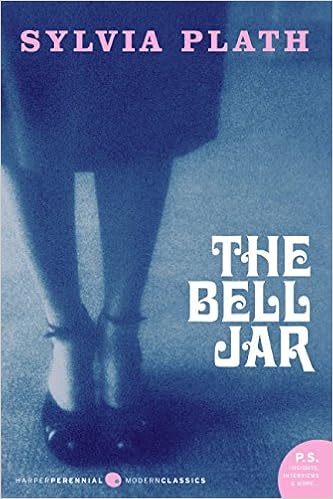Prompt: Read a book set in the summer
Pages: 288

The semi-autobiographical The Bell Jar details college student Esther Greenwood's summer interning for a New York magazine, her struggle with discovering who she is and who she wants to be, and her descent into mental illness (and *SPOILER* her eventual recovery, unlike author Plath, who committed suicide in 1963).
The Bell Jar is proclaimed as a staple feminist novel, and it's easy to see why. Esther is dissatisfied with the potential futures she sees before her: that of a housewife/mother, a stereotypically female profession such as stenography, and her current track of an English degree (which she is unable to imagine past graduation). Indeed, Esther's search for identity drives her into her depressive episode, during which she attempts to commit suicide several times.
Finally, worrying for her safety, her mother sends her to an asylum, where she receives treatment including electroshock therapy. For most of her time in the asylum, Esther merely exists, finding little to amuse or entertain her, save for her breakfast. She suffers from the typical depressive symptom of finding no pleasure in her old joys. This is despite her mother's and friends' and one-time boyfriend's attempts to get her to "snap out of it", so to speak. The treatment of mental illness has come a long way since the 1960s in which Sylvia Plath wrote about and experienced it, and that's something that we should all be glad about.
Plath's writing style is straightforward and honest, and amusing at times. Mostly, though, The Bell Jar is bleak and depressing. Esther's struggle to find her identity is relatable, as most of us at one time or another have wondered what on earth we are here for. Plath certainly conveys in a convincing fashion Esther's fears and concerns about what she is supposed to do with her life, and she gives a sympathetic and honest portrayal of Esther's struggle with mental illness. However, I found the bad/sad to far outweigh the good/happy in this book, so I was left with a bitter impression.
Final recommendation: Read it if you want to. I wouldn't go out of my way to recommend it, simply because I found it too dark to be enjoyable. I would warn against those who have struggled with depression or thoughts of self-harm reading it, simply because I worry that it would push them closer to suicidal thoughts and actions. Readers of The Bell Jar should know exactly what they're getting into before they start reading, and I definitely wouldn't recommend the book to anyone under 18 or so.